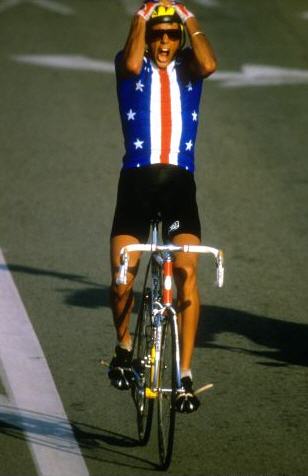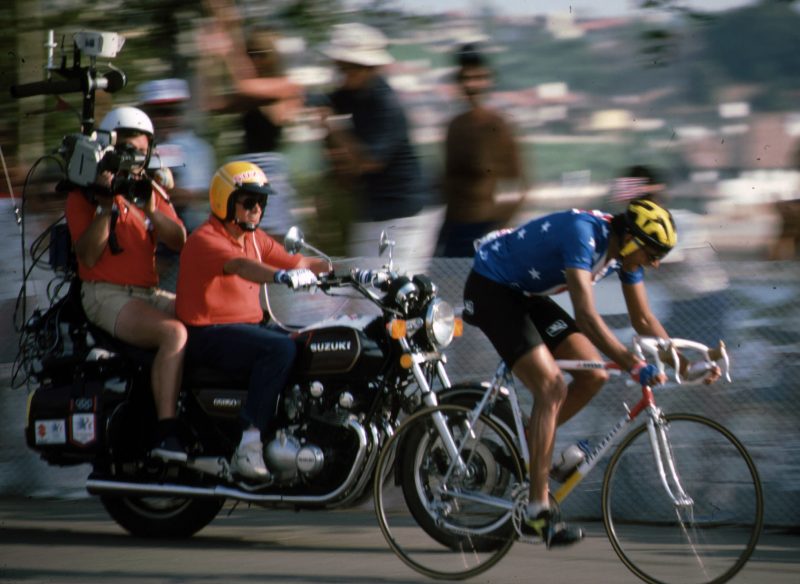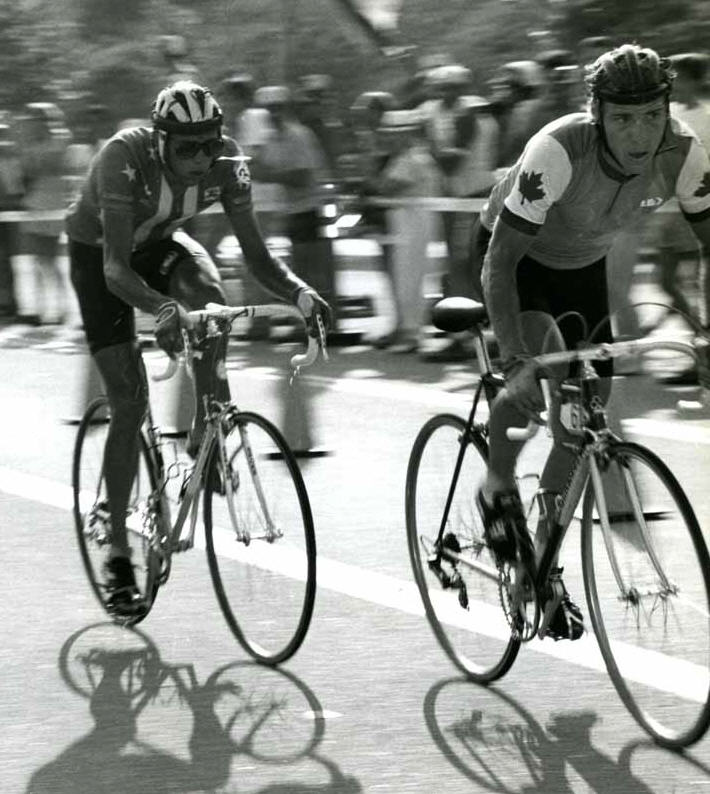The Olympics in L.A. – Mission Viejo, Sunday July 29th 1984 and Alexi Grewal wins the 190 kilometre Los Angeles Olympic Road Race for the United States in front of an estimated 300,000 home fans.
It should have been the start of a magnificent career for the talented man from Aspen, Colorado, but it didn’t work out quite like that.
Despite contracts with some of the best teams of the era — Panasonic, 7-11 and RMO — and flashes of brilliance, his Euro career never caught fire and he returned to the USA.
The wins came there, but to knowledgeable observers, his was always an example of unfulfilled genius. When someone pointed out to us that Alexi was on the comeback trail we just knew we had to talk to him, and Alexi also offered us the following great story about that amazing day, written in his own words. Read on!

Before we get too far down the road, there is a story I must tell. It is a story I have already shared with Davis Phinney, my main rival then and always. But now I will tell it for all.
The story of the Los Angeles Olympics, from my perspective. First off, I did not stay with the team before the event, because of my positive test for ephedrine at the Coor’s Classic I ended up flying out to L.A. on Len Pettyjohn’s dime with my own support crew. So what ever did or did not happen with the blood doping scandal of those days I had no part of it.
I rode my bike to the start. With Len Pettyjohn carrying my spare wheels and bottles. When I got there it was tense. My instructions were simple, ride for Davis, I said fine, except that I told Eddy I would be going solo late in the race. He said ok. That was the race meeting for me, the first time Eddy and I had spoken in months.
In the race however and in my mind and prep I never gave one thought to really giving away my chance. I was there to win, it was all I knew at that point in life.
Once the race started, of course there are duties you must do, play your part in the race be present to observe and watch the front. On the very first lap I had worked myself up to the transition zone at the front, the place where you have to choose to follow moves or stay put.
At the top of the first long climb both Ron Kiefel and I were present when a string of riders worked itself free as the climb crested and the road turned fast.
We both looked at each other. For a second, I am sure neither of us really wanted to be exposed that early in the race. No matter his demeanor Ron Keifel wanted to win just as much as anyone else. I have always considered him a hard man to beat.
He hesitated, we were in equally good positions to respond. Intuition told me to go, so I wound it up, saving my legs as best I could and made the effort to bridge and join. The second I got there I knew it was good. A free ride with the likes of the Austrian Helmet Weshelberger in the move and willing to drive it.
From that point forward a certain rhythm was established. I was up the road ahead of the other favorites with the exception of Helmut. I did not have to work and I only had to follow one man. The latitude was there to let him go also. It was more or less the perfect place to be in. I knew it. I was not thinking what I could do to help Davis, I was thinking how I could use the situation to work all my rivals against each other, and conserve my legs which were marginal.
I am an observant bike racer, the tension on the U.S. team was visible. Thurlow was ashen, Kiefel was quiet, Phinney was wearing a skinsuit. There was no doubt in my mind Keifel and Phinney were gonna be good. The skinsuit was information I filed away. Only one pocket was sewn into it and we faced a hot, hilly two hundred kilometer race. One feed zone per lap on a downhill, right near the start finish, wearing a skinsuit with one pocket was to rely on the unreliable.
Since I came with my own support, Arnold set up in the neighborhood days before the event. We had a chosen spot in the crowd on the long hill. A bottle would just come out of the crowd in Arnold’s hand to mine whenever I wanted it. The team feed zone was just gravy for me. I was never without what I needed, ever. Call it cheating, or call it good planning. It covered my bases.
The early break progressed. At no point was I stressed. I rode up Vista Lago at my own pace in my lowest gear in the early laps and only took token pulls. Memories blur a bit. But somewhere around fifty miles into the race, after a nice long free ride, the break started to splinter, the strong guys wanted to go and the others had already seen their glory. Helmut accelerated and Raul Alcala followed him up the hill past the feed. Helmut beckoned and asked me to come on. I deferred, there was a long way to go and I did not feel up to squaring off with him in a suicide break.
Half a lap later the lead chasers caught us. Bauer got there first, and looked good. Phinney followed up just shortly after, and looked like anyone who had to follow a Bauer move that day. Strong yes, worried a little. You could tell he had fired one bullet already.
It wasn’t a kilometer later that another move went. Easy for me to penetrate, not so easy for Steve and Davis. Another free ride for me , followed by another bridge from the field for the favorites. Bauer again the antagonist. Davis again controlling him.

Before you knew it, it was late in the race. 80 miles were gone. Then a crucial moment that changed the makeup of the race. Little splits were happening, Davis and one of the Norwegian’s; Dag Otto had a little gap. I was at the head of the field, and noticed Keifel out of position to respond, still hesitant.
And here is where it gets sticky, my motive. Sure it was a good time to go. But it was also the best time to separate Ron from Davis. You know if I come to line with Ron and Davis, I am obligated to lead them both. I can hear my thoughts to this day, “put Ron away now”. And I did, I punched it, bridged to the move and we drove it. Morten Saether made it with me as well as a Columbian.
As we looked back from the rise of the Start Finish Bauer came busting out of the field with Thurlow on his wheel. The die was cast and the break was free. There would be no catching us. To that point in the race I had never had to test myself not even once. In the break everybody rode, Davis harder than anyone.
Two laps to go Davis asks me for food. I lied, said I don’t have any, I justified it in my mind by thinking I might need it myself. But really I knew it all went back to the skinsuit. One pocket Davis, it is not enough. I believe all it would have taken for Davis to have won the Olympics was to have worn a jersey and carried enough food. He was riding good, really good. But I had other plans. He was my rival above all others and his mistake was not to be overlooked.
Prior to this point the tactic was circumstance. When Keifel hesitated on lap one, I was obligated to cover. It set in motion the entire race. I was covering the front they were covering the favorites and Bauer. If I had ended up with Davis at the Line I would have ridden for him, the same way I covered the early move. It would not have been my first choice, things seldom are. But he was the last person I wanted to see at the finish, and when he ran out of food his blood was in the water. And we both knew it.

On the second to last time up the long hill, remember it is now late in race, and it was a race of attrition, you just gradually get tired. Morten Saether the stronger of the two Norwegian’s punched it hard. Normally it would be my job to respond, and I even think I tried, but Davis unselfishly beat me to it and I followed him in a very hard acceleration to control the Dane. It hurt me, and it also woke up my legs, first hard move all day. In the middle of the hill my legs came to life, and for the first time that day I found a real rhythm. I settled in moved to the front and let it drive.
Toward the top of the hill I was comfortable in full tempo, first adrenaline all day. On my wheel was Davis, on his wheel Bauer. Davis had stayed in a low gear, legs blurred fast and breathing hard. Good for saving himself not so good for responding to another move.
I saw it and knew it was time to go.
Davis would not stay exposed for long. So I attacked, knowing Bauer would follow and drive it if there was a gap. And he did. It strung out everyone.
Everyone’s weaknesses were exposed and Davis was put in the position of having to really extend himself in an inopportune time.
That move and the almost identical one that I pulled on Vista Lago earlier in the same lap was enough to take advantage of Davis while his body was switching to his reserve tank.
It was enough weakness for Bauer to see and he tried a counter; I saw it and caught his wheel, countered his counter and went one more time. I was free. You saw that on TV.
It was a simple strategy, put Bauer up against Davis all day. I did not really plan it, but once I saw it, it was easy to have it repeat itself again and again. One the crucial penultimate lap I drew Bauer out myself. He would catch me and drive it. And I had a free ride, while Davis, my teammate was strung out in the chase.
On the last lap in the feed Bauer attacked while Davis was taking fuel. There was no bringing him back that time. And I was up the road waiting for my free ride.
As a rider Davis never hesitated, never was selfish and would always do more than his share of the work. This is the real story of how I beat him. It was not heroic.
This article was first published by Alexi on his website, “Back in Among the Wheels“.



